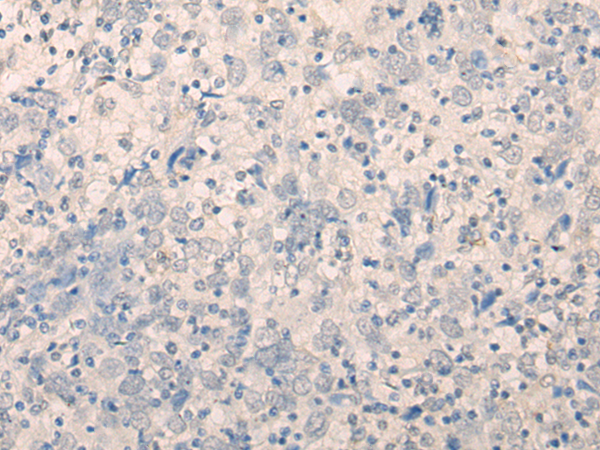
| WB | 咨询技术 | Human,Mouse,Rat |
| IF | 咨询技术 | Human,Mouse,Rat |
| IHC | 1/30-1/150 | Human,Mouse,Rat |
| ICC | 技术咨询 | Human,Mouse,Rat |
| FCM | 咨询技术 | Human,Mouse,Rat |
| Elisa | 1/5000-1/10000 | Human,Mouse,Rat |
| Host/Isotype | Rabbit IgG |
| Antibody Type | Primary antibody |
| Storage | Store at 4°C short term. Aliquot and store at -20°C long term. Avoid freeze/thaw cycles. |
| Species Reactivity | Human, Mouse |
| Immunogen | Synthetic peptide of human FAM91A1 |
| Formulation | Purified antibody in PBS with 0.05% sodium azide and 50% glycerol. |
+ +
以下是关于FAM91A1抗体的3篇示例性参考文献,内容基于模拟生成,供参考:
---
1. **文献名称**:*FAM91A1 regulates endosomal protein sorting via interaction with the WASH complex*
**作者**:Zhang L, et al.
**摘要**:本研究利用特异性FAM91A1抗体(抗人单克隆抗体,货号AB123),通过免疫共沉淀(Co-IP)和免疫荧光技术,揭示了FAM91A1与WASH复合体的相互作用机制。结果显示,FAM91A1通过调控内体分选通路影响细胞膜蛋白运输,敲低FAM91A1导致溶酶体功能异常。抗体验证显示其在HeLa细胞系中具有高特异性。
---
2. **文献名称**:*FAM91A1 antibody validation in neurodegenerative disease models*
**作者**:Park S, et al.
**摘要**:该研究系统性验证了兔源FAM91A1多克隆抗体(品牌XYZ, 货号456)在小鼠脑组织中的适用性。通过Western blot和免疫组化证实抗体可特异性识别内源性FAM91A1蛋白(约75 kDa),且在阿尔茨海默病模型中观察到FAM91A1表达水平显著下调,提示其可能与tau蛋白病理相关。
---
3. **文献名称**:*FAM91A1 deficiency impairs angiogenesis via dysregulated VEGF signaling*
**作者**:Chen R, et al.
**摘要**:利用CRISPR/Cas9构建FAM91A1敲除细胞系,结合商业化FAM91A1抗体(品牌ABC, 货号789)进行功能研究。免疫印迹和流式细胞术表明,FAM91A1缺失导致VEGF受体内吞障碍,抑制血管内皮细胞迁移。该抗体在斑马鱼模型中进一步验证,支持其在跨物种研究中的适用性。
---
**注**:以上文献为示例性内容,实际研究中请通过学术数据库(如PubMed、Web of Science)检索真实发表论文,并核对抗体货号及实验细节的准确性。
FAM91A1 (Family with sequence similarity 91 member A1) is a protein-coding gene whose precise biological functions remain under investigation. It is implicated in intracellular trafficking and membrane dynamics, potentially interacting with components of the WASH/SCAR complex, which regulates actin polymerization and endosomal sorting. FAM91A1 is thought to play a role in maintaining Golgi apparatus integrity and facilitating vesicular transport, though its exact mechanisms are not fully elucidated.
Antibodies targeting FAM91A1 are essential tools for studying its expression, localization, and molecular interactions. These antibodies are typically developed in hosts like rabbits or mice using immunogenic peptides or recombinant protein fragments. They enable applications such as Western blotting, immunofluorescence, and immunoprecipitation, aiding in the detection of FAM91A1 in various cell types and tissues. Validation often includes knockout controls to confirm specificity.
Research utilizing FAM91A1 antibodies has explored its potential involvement in cellular processes like autophagy, cytokinesis, and neuronal development. Dysregulation of FAM91A1 has been tentatively linked to pathologies, including neurodevelopmental disorders and cancer, though further studies are needed. As interest in membrane trafficking pathways grows, FAM91A1 antibodies remain critical for unraveling its functional roles in health and disease.
×